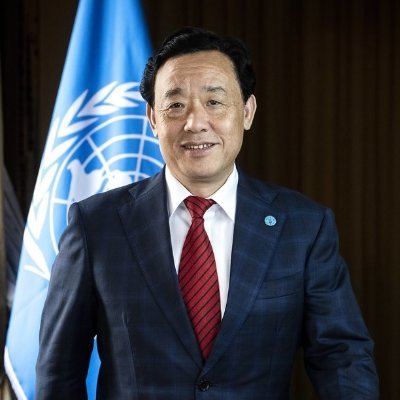
Rome – The Director-General of the Food and Agriculture Organization of the United Nations (FAO), QU Dongyu, today underscored the critical contribution of science and innovation to the transformation of agrifood systems and pointed to the UN agency’s recently adopted thematic Strategy on Science and Innovation as an important tool to help deliver FAO’s Strategic Framework 2022-31 in support of the 2030 Agenda for Sustainable Development.
“FAO’s first-ever Science and Innovation Strategy, recently endorsed by the FAO Council, is historic and will ensure that science, innovative solutions and technical tools will be crosscutting in FAO’s programme of work over the next 10 years,” Qu said in his opening remarks at a side event of the 28th session of the Committee on Agriculture (COAG).
The FAO Director-General emphasized how the challenges facing the world today, including conflicts, humanitarian emergencies, the COVID-19 pandemic, and the climate crisis, are also heavily affecting agrifood systems, hence the need for rapid change. “Transformation is critical, and science and innovation are key accelerators to achieve this change. This Strategy will help us to achieve a new level of productivity, quality, diversity, efficiency, and environmental sustainability in agrifood systems,” Qu said.
The Strategy promotes a holistic approach to minimize trade-offs using science, technology and innovation, and enabling policies with particular attention to the needs of low- and middle-income countries, as well as small-scale producers, women, youth and Indigenous Peoples.
Noting how science and innovation are already fully embedded in the work of FAO, the Director-General cited several examples as reflected in the items of this week’s COAG agenda. These included the Hand‐in‐Hand initiative, which identifies the biggest opportunities to accelerate agricultural transformation and sustainable rural development by using the latest up-to-date tools available, including advanced geospatial modeling and analytics. He also mentioned the 1000 Digital Villages Initiative and the Joint FAO/IAEA Centre of Nuclear Techniques in Food and Agriculture.
“FAO is also supporting innovative approaches with a strong focus on addressing the challenges stemming from climate change and biodiversity loss, such as the bio-economy approach,” Qu added, explaining that this is a sustainable, circular bioeconomy that promotes the sustainable use of biological resources instead of finite resources for better production, better nutrition, better environment and better life in order to achieve the Sustainable Development Goals (SDGs).
What needs to be done better
The FAO Director-General noted however, that science and innovation alone are not enough, and that enabling policies are needed that respond to the needs of small-scale producers and also family farmers.He summarized in three points what needs to be done better.
“First: we must implement our two new thematic strategies on Science and Innovation, and on Climate Change, in a coherent and synergetic way” he said, adding that science and innovation are critical to finding solutions to the climate challenges we are facing today.
“Second: we must do better at monitoring the diffusion of innovations, at promoting adaptation to local needs, and at scaling up successful implementation. Better knowledge management is key,” he said.
“Third: we need to improve our extension systems, using the best available technologies, including digital technologies, to effectively reach small-scale producers,” Qu stressed and that digital and other gender gaps in access to innovations are not acceptable. He underlined how important it is to work with women “from the earliest stage of research to the final stages of adoption and adaptation, in order to take concrete steps to ending hunger and poverty”.
COAG 28 agenda
The discussions at the 28th Session of COAG cover a range of key topics for which science and innovation are extremely relevant, including food safety, livestock, One Health, antimicrobial resistance, the State of the World’s Land and Water Resources for Food and Agriculture (SOLAW), soils, agricultural plastics, climate change, agricultural innovation, the linkages between agriculture and forestry, mainstreaming biodiversity, the UN Decade on Family Farming, the UN Decade on Ecosystem Restoration .
COAG 28 is taking place as a hybrid event from 18 to 22 July 2022. COAG is FAO’s main technical advisory committee on agriculture. It provides overall policy and regulatory guidance on issues relating to agriculture, livestock, food safety, nutrition, rural development and natural resource management.





